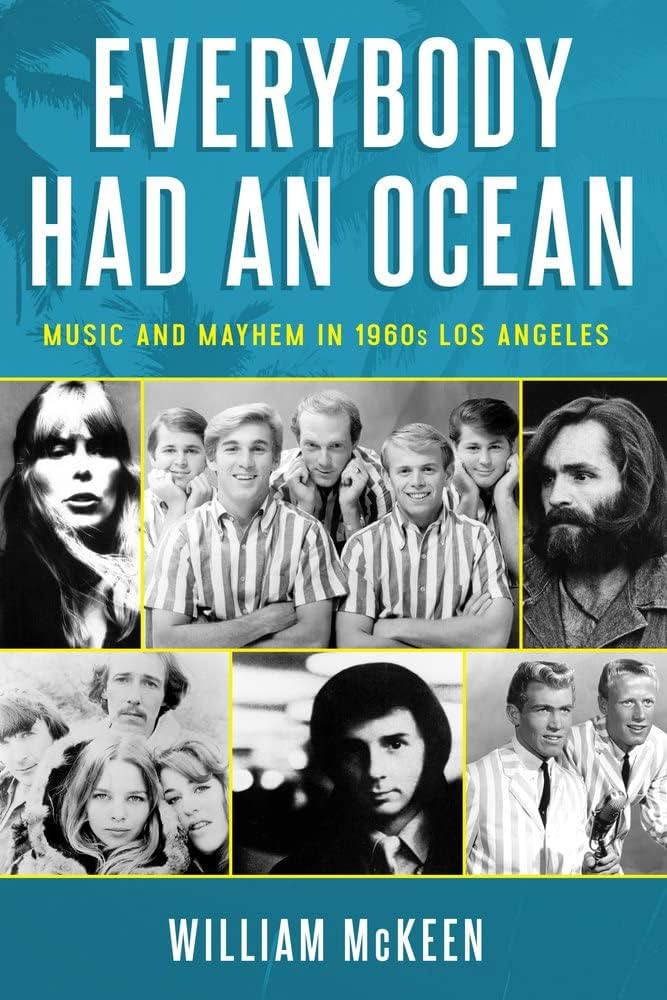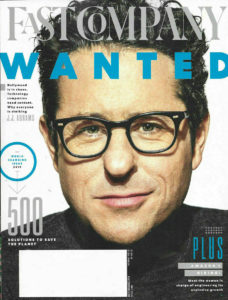Newest stuff first. Scroll down for news from the last few years.
. . . . . . . . . .
JULY 2025
Hunter’s Home Sweet Home
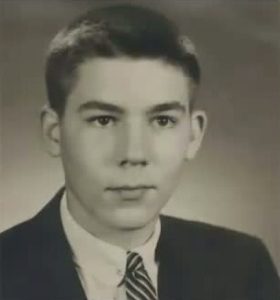
Do we ever get over high school?
We move on, but we still think about our old friends and tormentors and pleasing them is important. We still care about what people think of us.
As famous as Hunter S. Thompson became, the people in his hometown still mattered to him.
Reporter Josh Wood of the Courier-Journal in Louisville, Hunter’s hometown, did a piece about what parts of Louisville always stayed with him. He talked to me, Peter Richardson (author of Savage Journey about Hunter’s politics) and a few others.
The story is here.
. . . . . . . . . . . . .
JUNE 2025
Farewell to a Beach Boy
Sometimes, I feel as if I am on dead-rock-star speed dial.
Ever since publication of Rock and Roll is Here to Stay a quarter century ago (and which you can order here), I get calls from reporters before the body gets cold.
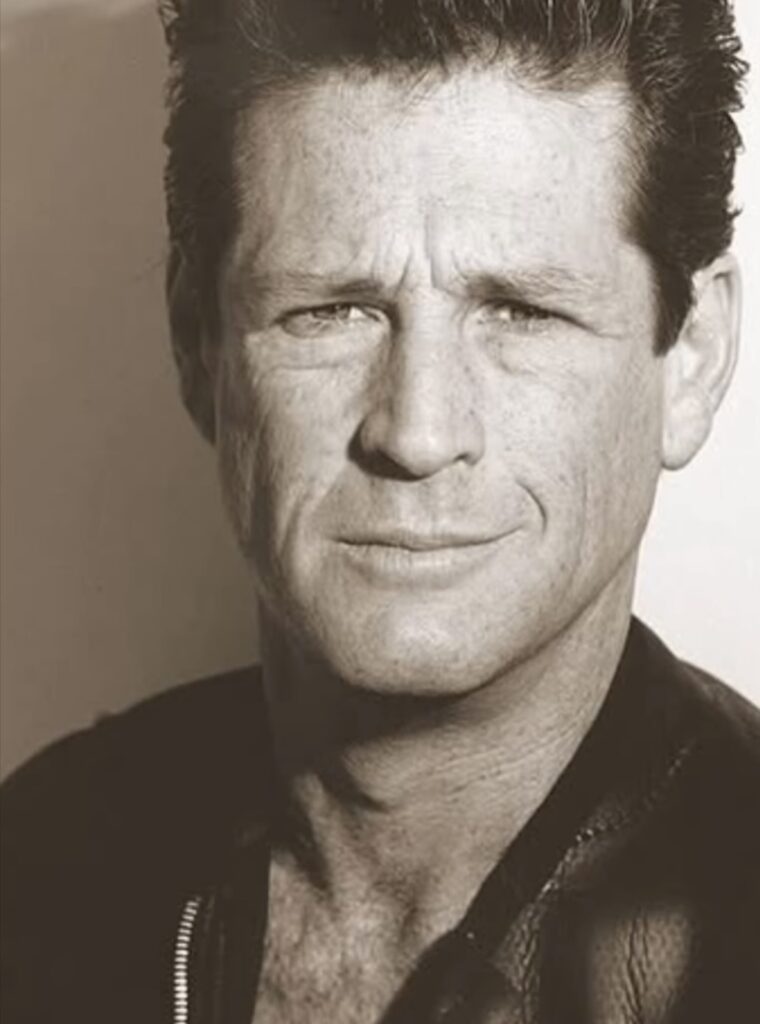
And sometimes, the body is still warm.
After Hurricane Katrina, I got a lot of calls from journalists putting together obituaries. Problem was, Fats Domino wasn’t dead yet. He was rescued from the attic of the house where he’d hunkered down. (Or, considering he was found in the attic, let’s make that hunkered up.)
When Maurice Gibb of the BeeGees died, I was happy to talk about the beautiful harmonies those Gibb brothers spawned. Yet the AP reporter didn’t quote my comment on what I thought was one of the singer’s greatest achievements (“He fought a valiant battle against a receding hairline.”)
When Brian Wilson died earlier this month, I missed the call from the BBC and by the time I returned the message we’d passed another full news cycle. I’m not as diligent about responding during the summer.
The Los Angeles Times didn’t call me, but quoted me anyway. In this piece, they had me saying something I have no memory of saying and affiliating me with the University of Florida, with which I have not been affiliated for 15 years.
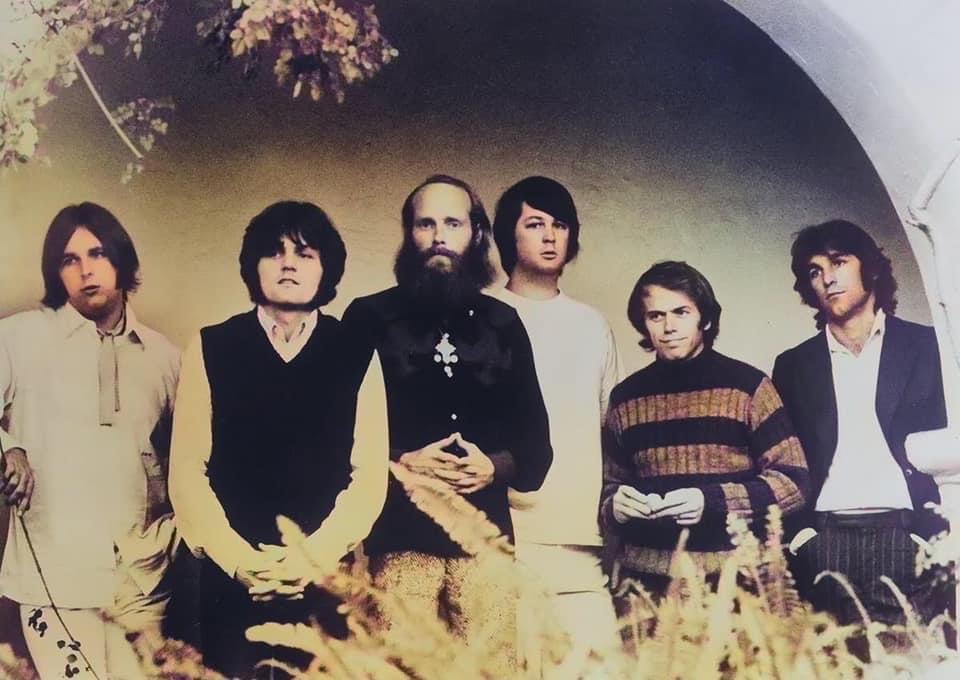
Maybe it’s a good thing they didn’t get me. What usable quote could I give them through my blubbering?
All right, I wasn’t really crying. And I was lucky to get the news from my pal and fellow Brian Wilson believer, Wayne Garcia. Wayne even named his firstborn Brian. I’ve never gone that far, but that’s mostly to avoid saddling a spawn with “BM” for initials.
Brian was the only Beach Boy I never interviewed. In my Saturday Evening Post days, my mentor Starkey Flythe and I collaborated on a profile of the band for the magazine. “The Endless Summer of the Beach Boys” was credited to Samuel Walton, one of Starkey’s pseudonyms. (A plethora of pseudonymns gave readers the impression the magazine had a large staff. This was a time, my friends, before the world at large had knowledge of Walmart and its founder, with whom we shared that pseudonymn. Starkey also masqueraded as F.X. O’Connor. I liked the pen name Captain Asparagus, which I’d seen in a local zine.)
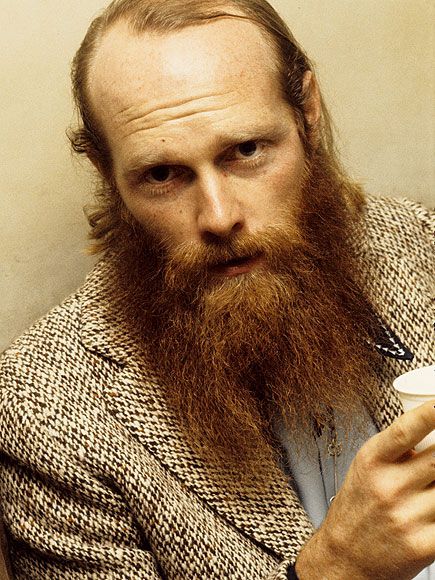
Starkey and I followed the Boys through a couple of gigs to get material for the story.
During the stay in Cincinnati on their annual summer tour, we had dinner with Mike Love and his wife. Mike is a divisive figure with fans, but all I can say is that he was a charming dinner companion, even if he did not accept my revised “California Girls” lyrics for my proposed “Prehistoric Girls:”
Well, neanderthal girls are hip, I really dig the skins they wear
And the cro-mangon girls, with the way they stalk,
They knock me out when I’m down there
The Midwest savages’ daughters really make me feel all right
And the Mayan girls, with the way they kiss,
They keep those temples warm at night
I wish they all could be prehistoric girls
Mike gave me a hard pass. (And yes, I know I am bending science history to put together this paean.)
(Later, in the 1990s, I thought about sending Mike new lyrics to be paired with the “Catch a Wave” music: Get your keyboard and go internet surfin’ with me. The scary thing is, Mike might’ve gone for that one.)
We had a great afternoon interviewing Carl Wilson and Alan Jardine. I still have a song in my head that Jardine was writing about polypeptides. (This was in the days when the Beach Boys were uber-creative, before they were doomed to life as an oldies band.)
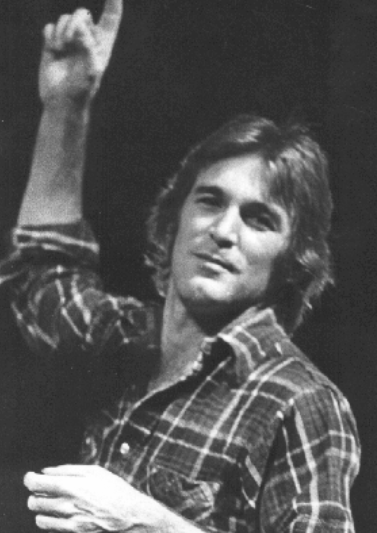
Dennis Wilson did not want to be intervewed but asked us to his room to watch TV, then ride with him to the concert venue, Cincinnati’s Riverfront Colliseum. He was a wonderful guy. I ended up interviewing him three times over the years and he was always enchanting and hilarious. He was generous with his time and talent.
I never interviewed Brian, but perhaps that’s just as well. Starkey interviewed him when he was on the West Coast for another assignment. He said it was the weirdest interview he’d ever done. Brian was in his chain-smoking 340-pound period.
Starkey told me he’d mentioned me to Brian.
“Brian,” he said by way of introduction, “I bear greetings from your biggest fan.”
“Who’s that?” bathrobed Brian growled.
“Bill McKeen.”
Brian pondered for a minute, searching the fulsome settlings in his brain. “Never heard of him.”
I have been a Beach Boys fan for nearly 60 years. I discovered them during that lost period after their initial fame and before they were rediscovered as an oldies act.
If you truly love the Beach Boys, then they drive you crazy. You know they are / were capable of greatness. And you also know they can / did produce some sub-par stuff.
Years ago, a writer for the Florida Times Union in Jacksonville wrote something like this:
We can put a man on the moon, but we can’t stop people from wearing spandex pants to the mail. The Beach Boys will drive you crazy that way.
I wish I had kept that artice so I could acknowledge the writer and get the quote right.
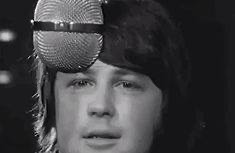
I hardly ever listen to the early Beach Boys stuff, much as I liked it. Yet when I learned Brian died, my hand — working independetly from my brain — reached into my record bin for All Summer Long (1964).
Some of those early albums (OK, Shut Down Vol. 2, All Summer Long and Today) were marred by needle-lifting skits that I despise. At least the one on All Summer Long is kind of funny.
I prefer the albums of the “lost years,” after the huge early fame and after Brian’s magnum opus, Smile, went down in flames (which he resurrected in 2004). Those albums were all commercial flops but they remain pure and beautiful healing music: Smiley Smile and Wild Honey (both 1967), Friends (1968), 20/20 (1969), Sunflower (1970), Surf’s Up (1971) and Holland (1973). I leave out only So Tough (1972) because that album was a mixed bag — and short. (In my old age, I’ve grown to appreciate it more.)
So when I feel like listening to the Beach Boys, those albums are the ones I reach for. The band’s last album, That’s Why God Made the Radio (2012) had some of the most sublime moments in the group’s history. The last three songs on the album are heartbreakingly beautiful. The last song on their last album was, appropriately enough, called “Summer’s Gone.” It was grandly depressing and majestic.
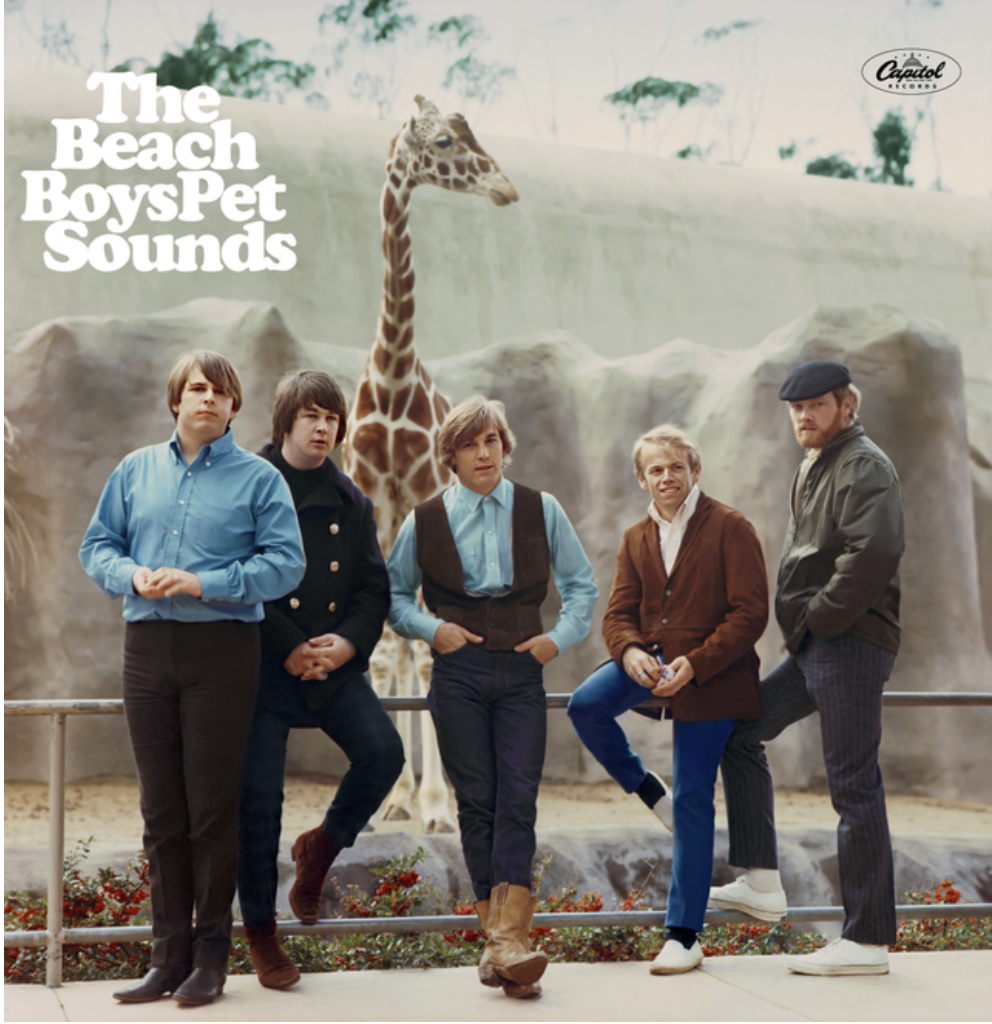
I have reverence for Pet Sounds (1966). Listening to it is often difficult for the emotions it churns up. It has been an indelible part of my life since I was in a teen-ager with an 8-track in my Opal, with Pet Sounds on a continual loop. That tape stayed in the player for a year, and I heard the album so much it seeped into my sinews. Kind of like Steve McQueen in The Blob: this thing absorbed me and became part of my essence.
The album is so good that I can’t listen to it. It takes too much out of me.
Plus, I don’t have to listen to it. Every vocal, every note, every banjo strum, every drum bash, every belching tuba and barking dog is stored in my head.
There’s a lot to be said about Brian. He had an odd (no surprise there) solo career that included the occasional brilliant piece of original work — That Lucky Old Sun (2008) — and intriguing albums devoted to George Gershwin and Disney music.
The Wilson brothers are all gone now. To me, the Beach Boys ceased to be when Carl Wilson died in 1998. With no Wilson onstage, there were no Beach Boys. What’s out there on the road is Mike Love with a very good (I’m told) Beach Boys tribute band.
So. Brian is gone.
We toil in melancholy, but as Brian’s music often helped me to do, I find some kind of joy inside the sadness.
I used the Beach Boys to frame my story of Los Angeles music in the 1960s, Everybody Had An Ocean (which you can order by clicking on the cover at left) and here’s how that book ended:
“Creating art allows us to beat the odds and find immortality, without having to do the whole Doctor Faustus thing. Though Brian Wilson and Mike Love no longer collaborate and Carl and Dennis Wilson are gone, they are all still together on the radio late at night, where they join voices and are young and golden and beautiful forever.”
And now, for fun, here are my favorite Beach Boys songs in chronological order. I realize no one gives a shit about this, but I like to amuse myself.
You will note the absence of “Kokomo” on this list. This is not an oversight. Brian was in California and was told about the “Kokomo” session in Atlanta only 24 hours before the studio was scheduled. He was unable to make the session. Brian was also absent from the recording of “I Can Hear Music” in 1969. That was during a rough period when he had trouble engaging with the human race, and marked sort of a changing of the guard. The Master (Brian) had taught his young grasshopper (Carl) well.
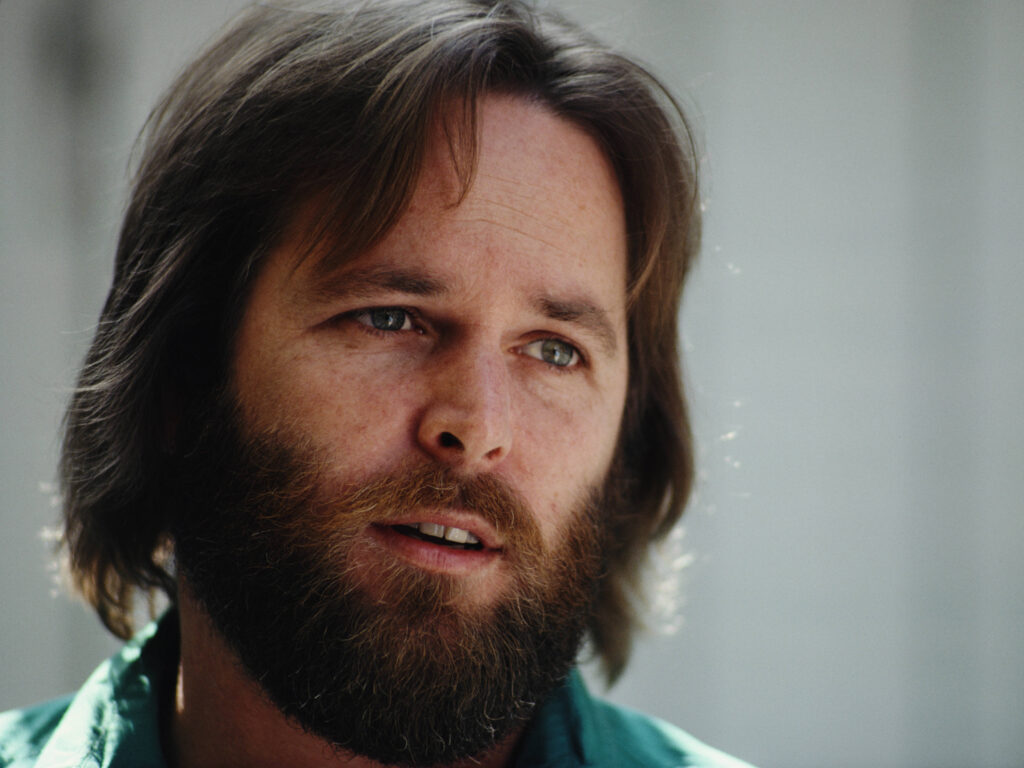
Both “Kokomo” and “I Can Hear Music” feature Carl’s angelic voice. It was funny to see the flurry of posts by fans after Brian’s death. Seems like everyone posted “Kokomo,” a song on which he did nothing.
So here is my list, though no one outside a lunatic asylum cares about this:
1962: “Surfin’ Safari.”
1963: “Surfin’ USA,” “Farmer’s Daughter,” “Shut Down,” “Surfer Girl,” “Catch a Wave,” “The Surfer Moon,” “In My Room,” “Our Car Club,” “Boogie Woodie,” “Little Deuce Coupe,” “Car Crazy Cutie” (musically identical to “Pamela Jean”), “Cherry Cherry Coupe.”
1964: “Fun Fun Fun,” “Don’t Worry Baby,” “The Warmth of the Sun,” “This Car of Mine,” “Why Do Fools Fall in Love,”* “I Get Around,” “All Summer Long,” “Hushabye,”* “Little Honda,” “We’ll Run Away,” “Wendy,” “Don’t Back Down.”
1965: “Do You Wanna Dance?,”* “Good to My Baby,” “Don’t Hurt My Little Sister,” “Dance Dance Dance,” “Please Let Me Wonder,” “I’m So Young,”* “Kiss Me Baby,” “In the Back of My Mind,” “The Girl From New York City,” “Girl Don’t Tell Me,” “Help Me Rhonda,” “California Girls,” “You’re So Good to Me,” “The Little Girl I Once Knew.”
1966: “Wouldn’t it Be Nice?,” “You Still Believe in Me,” “Don’t Talk (Put Your Head on My Shoulder),” “I’m Waiting for the Day,” “Sloop John B,”* “God Only Knows,” “Caroline No,” “Good Vibrations.”
1967: “Heroes and Villains,” “Vegetables,” “Little Pad,” “Wind Chimes, “Wonderful,” “Wild Honey,” “Darlin’,” “Aren’t You Glad,” “I Was Made to Love Her,”* ” Let the Wind Blow,” “Mama Says.”
1968: “Friends,” “Wake the World,” “Little Bird,”** “Be Still.”**
1969: “Do it Again,” “I Can Hear Music,”* “Cotton Fields,”* “I Went to Sleep,” “Time to Get Alone,” “Our Prayer,” “Celebrate the News,”** “Cabinessence.”
1970: “Their Hearts Were Full of Spring,”* “Slip on Through,”** ” This Whole World,” “Add Some Music to Your Day,” “It’s About Time,”** ” Forever,”** “All I Wanna Do,” “At My Window,” “Cool Cool Water.”
1971: “Long Promised Road,”*** “Feel Flows,”*** “‘Til I Die,” “Surf’s Up.”
1972: “You Need a Mess of Help to Stand Alone,” “Marcella,” “All This is That,” “He Come Down,” “Cuddle Up.”**
1973: “Sail On Sailor,” “Steamboat,”** “California,”# “The Trader,”*** “Only With You,”** “Funky Pretty.”
1976: “Palisades Park.”*
1977: “Mona,” “Johnny Carson,” “Good Time,” “Honkin’ Down the Highway,””The Night Was So Young,” “I’ll Bet He’s Nice,” “I Wanna Pick You Up,” “Airplane.”
1978: “Sweet Sunday Love.”
1979: “Good Timin’,” “Angel Come Home,”*** “Love Surrounds Me,”** “Baby Blue.”**
1980: “Goin’ On,” “Sunshine.”
1981: “San Miguel.”**
1985: “I’m So Lonely.”
1986: “California Dreamin.'”
1998: “Soulful Old Man Sunshine,” “Loop De Loop,””Sail Plane Song,” “Barbara.”**
2012: “That’s Why God Made the Radio,” “Isn’t it Time,” “From There to Back Again,” “Summer’s Gone.”
All songs by Brian Wilson, usually with a collaborator (sometimes two). The exceptions are (*) songs written by people outside the group. Other songs written by (**) Dennis Wilson, (***) Carl Wilson and (#) Alan Jardine. These are in order by release date. “San Miguel,” for example, was recorded in 1969-70, but not released until 1981.
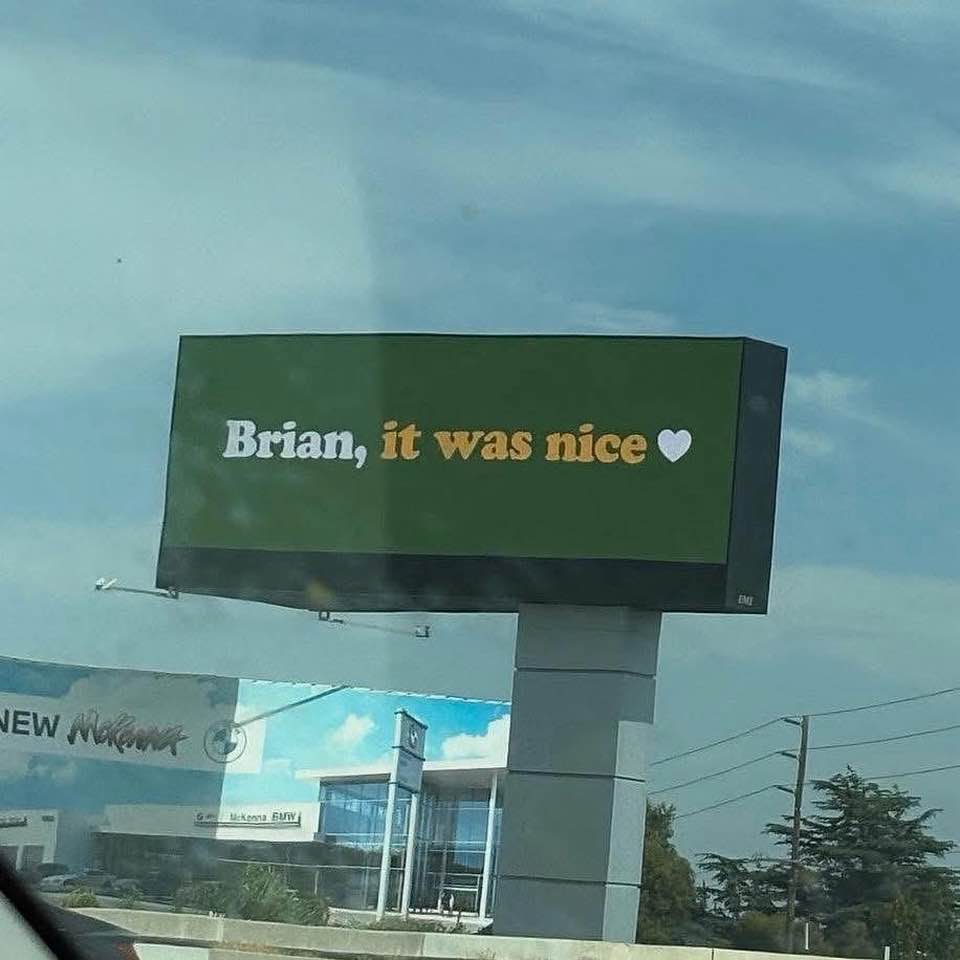
. . . . . . . . . . . . .
MAY 2025
Gonzo With the Wind
We celebrated our first outside-of-Louisville GonzoFest in May 2025 in New Orleans.
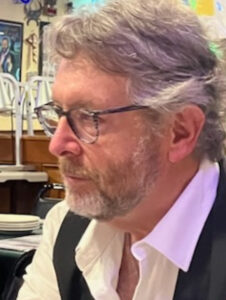
It was another chance to consider the life and legacy of Hunter S. Thompson.
I did a talk about the role of music in Hunter’s writing and there was a great panel on women who’d grown up in the nucleus of the Gonzo Atom.
Margaret Harrell, Hunter’s editor on Hell’s Angels, was there. So was David Amram. The 94-year-old composer-conductor played some spontaneous music. Poet Ron Whitehead rode herd on the brood and there was much live music and poetry, all reflecting the freedom we hear in the voice of Hunter Thompson’s writing.
Dan McNally, the musician who created Songs of the Doomed — an album of jazz inspired by Hunter’s writing — made his GonzoFest debut. To learn more about his album, click here.
I’ll post some photos from the event below.
We’re planning the next GonzoFest already. The subject: Hunter as a political philosopher. Hope to have the gathering on the East Coast somewhere.
Tally ho!
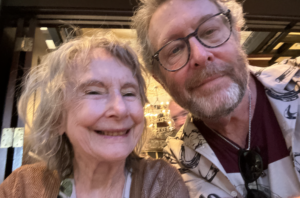
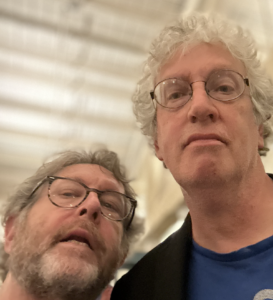
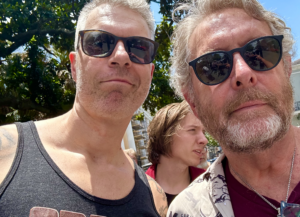
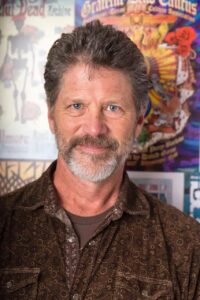
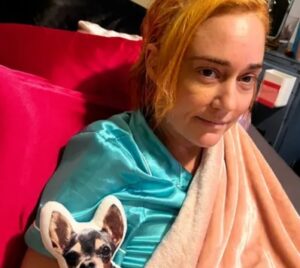 My friend and former student, Maggie Day, is dealing with her second brain tumor and could use some help with medical expenses.
My friend and former student, Maggie Day, is dealing with her second brain tumor and could use some help with medical expenses.
You’d think one brain tumor would be enough. Good Lord, I can’t imagine what she’s been through.
And we all know the state of the insurance industry and how difficult it can be to meet these sometimes crazy medical expenses.
So seriously — any amount helps.
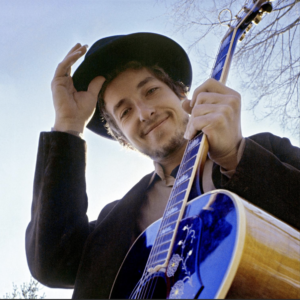 Her sister, Josie Day, has sent up a GoFundMe page. Please contribute.
Her sister, Josie Day, has sent up a GoFundMe page. Please contribute.
When I met Maggie a couple of decades back, I asked for her indulgence. I could not hear her name or think of her without the velvet tones of Nashville Skyline-era Bob Dylan in my head. Sometimes, this meant that I would sing a verse or two. She always overcame the temptation to kill me, and for that I am grateful.
So I offer this song to you to listen to as you donate. Consider this your reward.
Click on Smilin’ Bobby to hear “Peggy Day.”
. . . . . . . . . . . . .
SUMMER 2024
The Importance of Mentors
I was flattered to be asked to be part of the Vitamin PhD Podcast at dear old Boston University. Looking over the other people interviewed for this season, I feel like a mouth-breathing dope.

Nonetheless, the conversation was fun for me.
The podcast is in its 11th season. This season is hosted by Whitney Souery (earning an MD and a PhD in Bioinformatics) and Ayantika Saha (earning her doctorate in Biophysics).
The purpose of the series is to take a deep dive into the lives, careers, and daily habits of successful PhD graduates across a range of disciplines and career stages.
The goal, in these conversations, is to go beyond the bullet points of a CV and explore the difficult decisions, challenges, and truths that guide academic careers.
I ended up talking about mentors in my time at the mic.
Hope you like. Here’s the whole season. I’m Episode Five. (So hard to say without adding “The Empire Strikes Back.”)
. . . . . . . . . . . . .
AUGUST 2024
We Came Upon a Child of God
And He Was a Lot Older Now

I recorded a presentation a few years back on the Woodstock Festival and here is an excerpt from the organization’s newsletter including a short version of the thing I wrote for the 55th anniversary of that wild weekend. (The longer version can be found in my blog.)
This is the text from the Curiosity University newsletter:
Though it’s frequently portrayed as this crazy, unbridled festival of rain-soaked, stoned hippies dancing in the mud, Woodstock was obviously much more than that – or we wouldn’t still be talking about it…People of all ages and colors came together in the fields of Max Yasgur’s farm.
In this day and age, we all carry around endless hours of entertainment in our pockets. Yet, Taylor Swift still sells out her tour every night, Super Bowl tickets are still in demand, and 95% of all available seats to Broadway shows were filled last week. This just goes to show that Netflix, TikTok and Nintendo Switch have not replaced live entertainment; watching a concert, play, movie or sporting event with a crowd that shares your passion is still a unique and in-demand experience.
It’s the perfect time to celebrate live entertainment, as milestones this week include the birthdays of film industry giants–from directors Cecil B. DeMille and James Cameron, to early industry mogul Samuel Goldwyn. On a more somber note, August 16th also marks the passing of two legends who entertained millions: Babe Ruth in 1948, and Elvis Presley, in 1977. [Psst. My American History cover story on Elvis is here.)
This week we also commemorate the 55th anniversary of a milestone event that not only changed Rock n’ Roll forever, but influenced the future of all live entertainment: Woodstock. On August 15-18 in 1969, The Woodstock Music and Art Fair, billed on the posters as “an Aquarian Exposition: 3 Days of Peace & Music,” was held on a dairy farm in upstate New York. The once-in-a-lifetime event attracted a crowd of nearly 500,000, with a line-up of music legends that included: the Grateful Dead, Joan Baez, Jimi Hendrix, The Who, Santana, Joe Cocker, Janis Joplin, Jefferson Airplane, and Crosby, Stills, Nash & Young.
Grab some popcorn and join our experts for an in-depth look into some major events and famous figures in music.
. . . . . . . . . . . . .
APRIL 2024
Just the Facts, Man
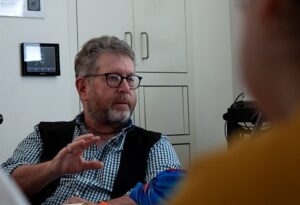
From The Journalist, the newsletter for the Boston University Department of Journalism.
Professor William McKeen teaches JO150 History and Principles of Journalism and JO542 Literary Journalism. He is also the author of eight books and the editor of four more.
Can you recommend a really good book on journalism?
I always liked The Boys on the Bus, Timothy Crouse’s book on the campaign press corps. Old book, but never loses relevance. Hard to narrow the list to just one, though. I like She Said (by Jodi Kantor and Meghan Twohey) a great deal, kind of a modern-day All the President’s Men.
Have you seen any good movies lately?
Yes — American Fiction with Jeffrey Wright. Also recently saw The Holdovers and Rustin. I recommend all of those films. On deep cable, I discovered the first version of A Town Like Alice, made back in the 1950s. The book (one of my favorite novels) is an epic and when adapted for television years ago, PBS turned it into a mini-series. It was interesting to see the first version, to see how they got the essence of the story boiled down to 90 minutes — great, economical storytelling.
What was the first job you had when you were young?
I started working for my local daily when I was a teenager. I worked as a reporter during the week and then picked up weekend hours as a copy editor. I lived at the office. The publisher put a lot of trust in me and I’ve always been grateful.
Where is your favorite place to vacation?
My favorite vacation was a road trip through the UK with my then-teenage sons. Also have a great fondness for Key West. I’d return to those places in a heartbeat.
What was your first job out of college?
I went to work at the Palm Beach Post. It was weird. I felt as if I was the only person in the city under 65. It was a much larger newspaper than I was used to and I was irritated that I didn’t get to work more than I did.
Can you share with us some of the stuff you like to do in your spare time?
I’d love to say I spend my spare time bench-pressing Buicks and tap-dancing on riverboats, but I like sedentary pursuits — reading, going to movies, trying to initiate conversations with my cats. I have many opportunities for vigorous, physical exercise. I avoid these.
If you could choose three people to have dinner with, who would you pick?
Living? That’s tough. If I’m looking for good dinner conversation, maybe David Sedaris or Sarah Silverman.
Dead? You know … the usual gang: Gandhi, Christ, Shecky Greene.
. . . . . . . . . . . . .
SEPTEMBER 2023
The Death of Jimmy Buffett
A lot of close friends died in 2023-2024. I miss Lucia Howe, William Munch, Jon Roosenraad, John Wright and many others.
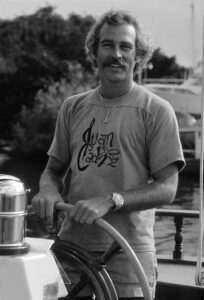
I did not know Jimmy Buffett, but I was good friends with his collaborator / pal Tom Corcoran. Tom’s death – a few months before Jimmy’s — came as a great shock.
Tom could do it all. He was a songwriter and novelist. His Alex Rutledge series is some of the best writing about Key West.
Though I didn’t know Buffett, my book about Key West, Mile Marker Zero, told the story of his arrival in the southernmost city and how Corcoran gave him space on his couch until he could get on his feet. They collaborated on “Cuban Crime of Passion” and “Fins.”
Because Buffett was a character in my book, writer Glen Rifkin called me to gather some information on Buffett. He was working on an advance obituary, the sort of thing news organiations like to have at the ready when a well-known person slips off to never-never land.
I obliged and told Glen, “You won’t be publishing that for a long time.”
Boy, was I wrong. Here is the Washington Post obituary that Glen wrote.
. . . . . . . . . . . . .
SEPTEMBER 2023
The Sporting Club
Buffett’s death had me taking a dive into my files from the writing of Mile Marker Zero. That book is kind of the biography of a friendship. The main characters were novelist Tom McGuane, poet-novelist Jim Harrison, painter Russell Chatham, honest-to-God French count Guy de la Valdene, musician and author Jimmy Buffett and novelist-songwriter Tom Corcoran.
They were sometimes called the Sporting Club, after McGuane’s first novel. He is the only survivor of this circle.
I took these portraits while interviewing McGuane, Harrison and Chatham in Montana. Those were some of the best days in my life and my pictures from that trip enchant me, if no one else.
The McGuane photo was used — at his suggestion — in an advertisement for fishing equipment that he endorses. So he must’ve liked it.
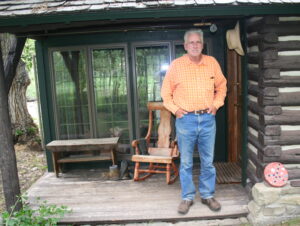
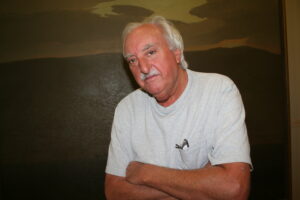
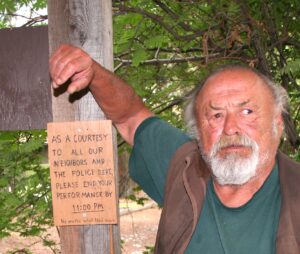
. . . . . . . . . . . . .
APRIL 2023
Jimmy Buffett’s Key West Life
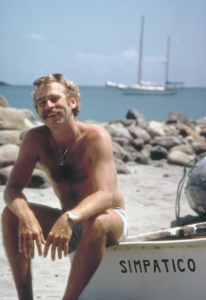 I appear on the “Welcome to Florida” podcast to discuss Jimmy Buffett’s early days in Key West. I cover that story — and a lot of other stuff — in my book Mile Marker Zero.
I appear on the “Welcome to Florida” podcast to discuss Jimmy Buffett’s early days in Key West. I cover that story — and a lot of other stuff — in my book Mile Marker Zero.
Click on Jimmy to listen.
Both Buffett and Tom Corcoran died in the last year. Tom gave Jimmy a couch, some spaghetti, song lyrics and beer when the unknown singer-songwriter first arrived in town.
Buffett and Corcoran are two members of the sprawling cast of characters in my book. Others include novelist Thomas McGuane (Buffett’s brother in law), actress Margot Kidder, writer Jim Harrison, painter Russell Chatham, gonzo journalist Hunter S. Thompson, actress Elizabeth Ashley and Guy de la Valdene, an honest-to-God French count. Ernest Hemingway and Tennessee Williams also pop in. Please visit the page about the book to learn more and to order.
The Welcome to Florida podcast is hosted by journalist Craig Pittman, author of Oh, Florida! and other fine books, and environmental journalist Valerie Vande Panne.
. . . . . . . . . . . . .
AUGUST 2023
Attention Fellow Readers!
I always have two or three books going at once. As the cliche says, “Children learn what they live.” I know I did. My father was a rabid reader. Every flat surface in the house had a book on it. He had a book going in every room.
Even when the family unit gathered in front of the electronic fireplace at night, he’d have a book. He wouldn’t consider giving a television show his attention.
 So folks like us, fellow readers — we’re always looking to know more about books and find new authors.
So folks like us, fellow readers — we’re always looking to know more about books and find new authors.
I was so happy to come across this site, Shepherd, which has a great approach to book talk. (Click here! They said something nice about my Mile Marker Zero book.)
I just wanted to share. Happy reading!
For the record, I’m discovering the novels of Charles Portis. There’s a new Library of America volume devoted to his Collected Works.
The guy was a masterful user of this language. He’s known mostly for True Grit, which is a tremendous, lyrical book, but right now I’m deep into The Dog of the South, which is hilarious.
The Collected Works also has a selection of his journalism, which is stupendous. He was a product of the same newsroom that gave us Tom Wolfe, Gloria Steinem and Jimmy Breslin.
Perhaps there was something in the water cooler.
^
. . . . . . . . . . . . .
FEBRUARY 2023
Making Music is Not a Crime
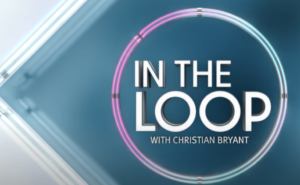 I confess mucho ignorance about modern music, but I still appreciate an artist’s work and the free society that protects said work.
I confess mucho ignorance about modern music, but I still appreciate an artist’s work and the free society that protects said work.
I was featured in a recent episode of In the Loop. I’m sort of the geezer in residence, giving a little background on the nature of crime and the music industry.
They asked me because that music-crime relationship is at the center of my book Everybody Had an Ocean. The subject is Los Angeles in the 1960s.
It was nice to be asked. I learned a lot from the program, which addresses why rap artists end up in court.
Click on the image above to view the episode.
. . . . . . . . . . . . .
JANUARY 2023
Lend Us Your Ears — for Outlaw Journalist
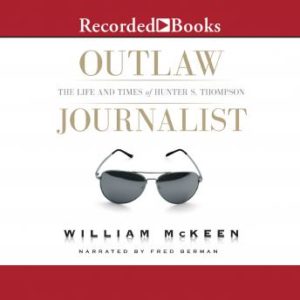 Recorded Books has recently been putting a push behind the audio version of my Hunter S. Thompson biography, Outlaw Journalist.
Recorded Books has recently been putting a push behind the audio version of my Hunter S. Thompson biography, Outlaw Journalist.
What a splendid way to learn about this great American author. The book includes many exciting swear words.
The book is performed by actor Fred Berman. I think he does an excellent job.
Buy the book and get two more books free.
Click on the cover to order.
. . . . . . . . . . . . .
JANUARY 2023
A Gonzo-Inspired Symphony
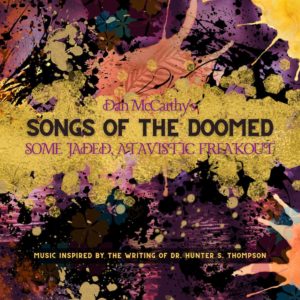 Musician Dan McCarthy has released Songs of the Doomed, a collection of pieces inspired by the writing of Hunter S. Thompson.
Musician Dan McCarthy has released Songs of the Doomed, a collection of pieces inspired by the writing of Hunter S. Thompson.
Music was important to Thompson. I’ve found that listening to certain music is subliminally inspiring. Thelonious Monk, John Coltrane and Miles Davis motivate me. Those artists never filed a flight plan and the improvisation goes to the gut. Listening requires that you engage with the music. It demands a response.
So I was blown away when McCarthy got in touch and started sending me some of his sound files. The finished work is excellent and he so effortlessly taps into the Gonzo zeitgeist. Here is an article about the album.
The title comes from Thompson’s 1990 book and is subtitled “Some Jaded Atavistic Freakout,” of which we/re sure Hunter would approve.
All of the music is original save for Jenn McCarthy‘s singing of Jefferson Airplane’s “White Rabbit,” a Hunter Thompson favorite. The musicians on the album are McCarthy, vibraphone; Don Scott, guitar; Luan Phung, guitar; Daniel Fortin, bass; and Ernesto Cervini, drums.
Here is the Bandcamp page for the album, and the Amazon page.
McCarthy asked me to write the liner notes for the album, so here they are if you are interested.
. . . . . . . . . . . . .
AUTUMN 2022
Listen! Perfect for Your Commute!
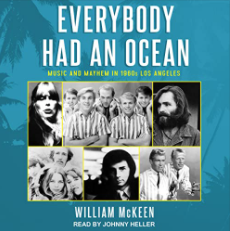 The audiobook of Everybody Had An Ocean is available now at Audible.com and other places where fine audio books are sold.
The audiobook of Everybody Had An Ocean is available now at Audible.com and other places where fine audio books are sold.
Actor Johnny Heller does an excellent job with the reading.
It makes for a life-changing listening experience.
Live up that commute and listen today. It was produced by the fine human beings at Tantor Audio.
From the Audible page devoted to the book: “Everybody Had an Ocean chronicles the migration of the rock ‘n’ roll business to Southern California and how the artists flourished there. The cast of characters is astonishing – Brian and Dennis Wilson of the Beach Boys, Jan and Dean, eccentric producer Phil Spector, Cass Elliot, Sam Cooke, Ike and Tina Turner, Joni Mitchell, and scores of others – and their stories form a modern epic of the battles between innocence and cynicism, joy and terror. You’ll never hear that beautiful music in quite the same way.”
. . . . . . . . . . . . .
AUGUST 2022
Rock’n’Roll University
The pandemic has opened up a lot of online-education opportunities.
 I’ve become affiliated with One-Day University and really have enjoyed creating and presenting these lectures and getting into invigorating Q&A sessions with those who participate.
I’ve become affiliated with One-Day University and really have enjoyed creating and presenting these lectures and getting into invigorating Q&A sessions with those who participate.
Here’s what I’ve done so far:
- The Times They Are A-Changin’. Music has always advanced the agenda of change. Rock ‘n’ roll did not invent the concept of protest music, but artists such as Chuck Berry, Eddie Cochran and Bob Dylan helped shape the changing country in the last half century. This course begins with the pre-rock traditions of protest found in folk music and in the social commentary of singers such as Billie Holiday. Chuck Berry imbued his early, classic rock ‘n’ roll songs with sly social commentary and Bob Dylan crafted anthems that endure: songs as relevant in 2022 as they were in the early Sixties. Professor McKeen will also explore how modern artists, such as Childish Gambino, carry forward the American tradition of music with a message.
- The Case for Bob Dylan. Bob Dylan won the Nobel Prize for Literature in the middle of the last decade, yet he didn’t ease off and instead kept his foot on the accelerator. In 2020, he released one of his most highly regarded albums, and he continues to reinterpret his massive canon of songs from a hundred stages a year. While he has a vast network of dedicated fans, he has perhaps a greater number mystified by his popularity. The usual complaint is his voice. In this presentation, we’ll examine Dylan’s remarkable 60-year career and show how he has been — and remains — a masterful singer. Songs will include: “Mr. Tambourine Man,” “Knockin’ on Heaven’s Door,” “Blind Willie McTell,” “Series of Dreams,” “High Water (for Charley Patton),” and “Like a Rolling Stone.”
- When Good Vibrations Went Bad.The Beach Boys – three brothers, a cousin, and a pal – defined the joy and optimism of America in the early 1960s: tousle-haired Jack Kennedy was in the White House and the Beach Boys provided the soundtrack of the New Frontier. They were the first great American rock’n’roll band and their songs celebrated the “Fun, Fun, Fun” of that more innocent time. After achieving critical success in the mid-1960s with the bold and groundbreaking Pet Sounds album and the “Good Vibrations” single, the band’s popularity fell off a cliff. Their principal songwriter, Brian Wilson – already suffering grievous mental issues — lapsed into a long period of withdrawal and decline. His younger brothers took the reins and led the group through the dark end of the decade, bringing Charles Manson into their circle. Despite the drama and dissolution, the group stayed active and produced some of the best music in its 60-year-history. At the time, the music went largely unheard. Now is your chance to listen to the music and hear their story.
- The Day the Music Died. In 1959, three young musicians came together for a tour of the upper Midwest. Each night, teenagers turned up at warm, cocoon-like ballrooms to greet the stars who’d made the 400-mile trips between venues on a bus with no heater. Two weeks into the tour, Buddy Holly got fed up with shivering on the road and hatched a plan to charter a plane to take him from frigid Iowa to even-colder North Dakota. Two other artists – Ritchie Valens and JP “Big Bopper” Richardson – joined him. When the plane crashed just after takeoff, a generation that felt itself invincible was shaken by these deaths of talents so young, and was left to wonder: If the best and the brightest are susceptible, then aren’t we all? Later immortalized by singer Don McLean as “The Day the Music Died,” this course will look at the life and works of artists who died too soon.
- Aretha 101. Aretha Franklin’s voice was a gift from God, so it’s appropriate that she grew up singing in her father’s church. Her talent was too great to be kept secret, so as a young woman, she was signed to Columbia Records by John Hammond. What could go wrong? Hammond was the force behind Robert Johnson, Bessie Smith, Benny Goodman and — eventually — Bob Dylan, Bruce Springsteen and Stevie Ray Vaughan. But lots went wrong. Aretha Franklin’s recordings for industry giant Columbia Records were … OK. After her five-year contract expired, Jerry Wexler pounced. Wexler was with independent label Atlantic Records. He had the genius idea of taking Aretha Franklin south, to a small studio in Muscle Shoals, Alabama. On an afternoon in 1966, her direction — and the direction of popular music — was forever changed. And then Aretha disappeared.
- Woodstock: How it Happened (and Why it Almost Didn’t). Imagine this: suddenly, you find out that a half million people are visiting this weekend. What will you serve? It wasn’t quite that way for the organizers of the Woodstock Festival in 1969, but it was close. The organizers planned for a crowd … but they never expected those kinds of numbers. This talk is about the behind-the-scenes machinations of putting the thing together against horrifying odds. For the organizers, this was an event along the lines of a community-involved art installation by the French artist, Christo. When Christo involved people in sharing a vision and a project, they discovered a journey more vital than a destination: the art was in the doing. We will also talk about the music, of course, and the abject fear the musicians felt with an audience that large.
Listening does require a membership, and if you are interested, link here. There are hundreds of wonderful classes available.
I particularly enjoying hearing from people after they’ve listened to one of my talks.
Now Available in Paperback
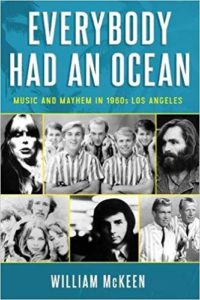
Everybody Had An Ocean
Music and Mayhem
in 1960s Los Angeles
Order the paperback here.
. . . . . . . . . . . . .
NOVEMBER 2021
Keep on Readin’ in the Free World
 Here’s my appearance on the wonderful podcast, “Booked on Rock.” Host Eric Senich invites authors of books on rock’n’roll to come on and yak about their book and music.
Here’s my appearance on the wonderful podcast, “Booked on Rock.” Host Eric Senich invites authors of books on rock’n’roll to come on and yak about their book and music.
We both geek out on the subject of Los Angeles in the 1960s, the subject of my book Everybody Had An Ocean. Click on the Booked on Rock logo to hear the podcast.
By the way, Everybody Had an Ocean is now available in paperback. It makes a wonderful gift. Order a few hundred copies here.
Watch this space for news of the upcoming audio book.
. . . . . . . . . . . . .
MARCH 2021
That Island in the Stream
 I had a nice chat with Cathy Salustri for her podcast, Florida Spectacular.
I had a nice chat with Cathy Salustri for her podcast, Florida Spectacular.
Our subject was my book Mile Marker Zero — about the writers, artists and musicians who assembled in Key West in the 1970s.
The cast includes Jimmy Buffett, Tom McGuane, Margot Kidder, Jim Harrison, Peter Fonda, Tom Corcoran and many others. I always enjoy revisiting this book and this conversation was a delight.
The hardcover is available from Crown Publishers and the paperback is available from the University Press of Florida.
Click on the logo to hear the conversation.
. . . . . . . . . . . .
JANUARY 2021
Where the Action Was
I finished my interviews for an upcoming 12-part television series about the Los Angeles music world of the 1960s. If that sounds familiar, it’s because I covered a lot of the same territory in Everybody Had An Ocean. (Order that fine book here.)
The series, which begins streaming midyear, is called Where the Action Was.
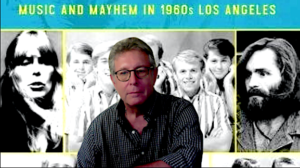
This picture is a screen capture from the interview. Note that the producers have a blowup of my book’s cover in the background. I hope this appearance helps boost sales. I keep telling the boys I’ll get them back to three meals a day, so this might help. (Note link above, which takes you to the purchase page for the book.)
The series is going to cover a lot of territory and its title is taken from the after-school daily rock’n’roll show that was on ABC in the days of my youth. “Where the Action Is” ran 1965-1967. Remember the theme song? — Dance dance dance when you hear that beat; Dance dance dance get up off of your feet. That show morphed into “Happening ’68,” which turned into “It’s Happening” before going off the air in 1969.
The host was the ubiquitous Dick Clark, but the regular (as in daily) guests — in their Revolutionary War attire — were Paul Revere and the Raiders. That group’s lead singer was Mark Lindsay, who serves as the on-camera host of Where the Action Was.
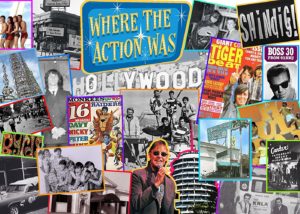
Lindsay was the driving force behind Paul Revere and the Raiders and was close to the group’s producer at Columbia Records, Terry Melcher.
For a time, Lindsay and Melcher shared a house at 10050 Cielo Drive in Los Angeles. When Melcher’s relationship with actress Candace Bergen became serious, Lindsay began to feel like a third wheel and moved out.
Melcher and Bergen eventually moved to a Malibu beach house owned by his mother, movie star Doris Day. Melcher leased the Cielo Drive house to filmmaker Roman Polanski and actress Sharon Tate. One theory about the subsequent notorious murders at that address was that Charles Manson sent his murderous minions to that house to scare the shit out of Terry Melcher. If that was the plan, it worked.
(Manson was aware that Melcher had moved. He had dropped by the house since Polanski and Tate moved in. He did not send his killers to the house to kill Melcher, but to frighten him. Manson had hoped Melcher would get him a recording contract.)
Both my book and the television series deal with Manson’s ability to infiltrate the rock’n’roll clerisy of Los Angeles, including Melcher, Dennis Wilson of the Beach Boys, Cass Elliot of the Mama and the Papas, Neil Young and Frank Zappa.
Update: This series is still in production, and looks more interesting all the time. Here’s a partial list of people interviewed for the series (some of whom have died recently): Steve Van Zandt, Roger McGuinn, Bruce Johnston, Mamie Van Doren, Rodney Bingenheimer, Don Randi, Bruce Johnston, Nils Lofgren, Jim Keltner, Henry Diltz and many others. I’ll post when the air date nears.
. . . . . . . . . . . . .
JANUARY 2021
Music as a Change Agent
My talk about American protest music — called “The Times They Are A-Changin'” — is posted on the One-Day University site. [Update: One-Day University is now part of Curiosity Stream.]
I use a lot of examples — from Billie Holiday to Bob Dylan to Childish Gambino — to talk about that most American of qualities, our desire to protest and fight for social justice and change.
Here’s the description from the One-Day University site:
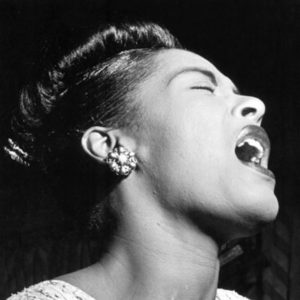
“Music has always advanced the agenda of change. Rock ‘n’ roll did not invent the concept of protest music, but artists such as Chuck Berry, Eddie Cochran and Bob Dylan helped shape the changing country in the last half century. This course begins with the pre-rock traditions of protest found in folk music and in the social commentary of singers such as Billie Holiday. Chuck Berry imbued his early, classic rock ‘n’ roll songs with sly social commentary and Bob Dylan crafted anthems that endure: songs as relevant in 2020 as they were in the early Sixties. Professor McKeen will also explore how modern artists, such as Childish Gambino, carry forward the American tradition of music with a message.”
I play these songs in their entirety (and excerpts from a couple more):
- “Strange Fruit” by Billie Holiday
- “Summertime Blues” by Eddie Cochran
- “The Lonesome Death of Hattie Carroll” by Bob Dylan
- “This is America” by Childish Gambino
I recommend a few more songs as a supplemental playlist (I had only 45 minutes, so I could play everything I wanted to play):
- “Deportee (Plane Wreck at Los Gatos)” by Woody Guthrie
- “Pastures of Plenty” by Woody Guthrie
- “I Ain’t Marchin’ Anymore” by Phil Ochs
- “Mississippi Goddam” by Nina Simone
- “Fight the Power” by Public Enemy
- “Alright” by Kendrick Lamarr
Preparing and performing the presentation — and taking questions at the end — was a lot of fun. Hope you have time to view and enjoy.
Though often these songs are rooted in contemporary events, the best of them (“Blowin’ in the Wind” is a convenient example) are timeless. This is a nation that by definition questions itself. When we sing the national anthem, we end with a question. These songs and so many others define who we are.
I hope you have time to listen to my talk.
. . . . . . . . . . . . .
MAY 2020
How Margaret Worked With a Mad-Dog Journalist
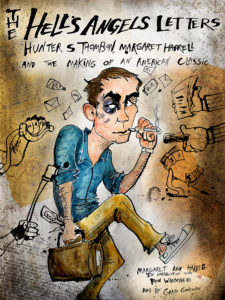 Margaret Harrell has published her memoir of guiding Hunter S. Thompson through the writing of his first book, Hell’s Angels.
Margaret Harrell has published her memoir of guiding Hunter S. Thompson through the writing of his first book, Hell’s Angels.
The Hell’s Angels Letters is an over-size book, generously illustrated with photographs and reproductions of Hunter’s frenetic letters.
Margaret has published a series of books called Keep This Quiet, but this is her first extended work about the process of working with Hunter and the delicate dance between writer and editor.
The book is available for order here.
I was flattered to be asked to contribute a short piece about Margaret. I got to know her (and interview her) while doing Outlaw Journalist. We’ve been on panels together at Gonzofest and George Mason University.
Read “There’s Something About Margaret,” my contribution to the book, here.
The Hell’s Angels Letters is a lavish book and is of great interest to Hunter’s fans and people interested in studying the mysteries of the creative process.
Check out Margaret’s website (margaretharrell.com) for interviews, pictures and other information.
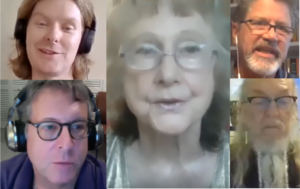 Here is a video of a two-hour panel discussion (via Zoom, of course) about the book, with Margaret, and a panel of people who’ve written about Hunter: Ron Whitehead, Peter Richardson, Rory Patrick Feehan and my own bad self. It’s hosted by Alice Osborn.
Here is a video of a two-hour panel discussion (via Zoom, of course) about the book, with Margaret, and a panel of people who’ve written about Hunter: Ron Whitehead, Peter Richardson, Rory Patrick Feehan and my own bad self. It’s hosted by Alice Osborn.
Ron knew Hunter and is, of course, the Grand Exalted Mystic Poobah behind Louisville’s annual Gonzofest. Peter is the author of several fine books, including an upcoming book on the birth of Gonzo. Rory wrote a brilliant doctoral dissertation on the literary creation known as “The Hunter Figure.”
Click on the montage of faces above (I’m on the left with Rory and Peter and Ron are at right; Margaret is in the middle) to hear the presentation.
. . . . . . . . . . . . .
FEBRUARY 2020
Remembering Hunter
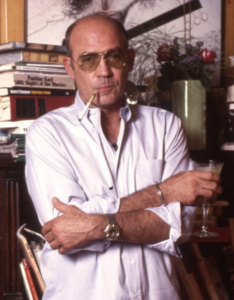
It’s been 15 years since Hunter S. Thompson’s death. Here is a link to the piece I wrote for the St. Petersburg Times the morning after his suicide. I used it as a the preface to Outlaw Journalist.
I’m quoted in a Gentlemen’s Quarterly article about Hunter Thompson‘s sometimes-difficult relationship with his hometown.
Louisville has finally begun to embrace the great and idiosyncratic products of its streets — Muhammad Ali (the airport has been renamed in his honor) and Thompson.
Fine citizens of that city, mostly led by poet Ron Whitehead, are working to maintain the Thompson legacy. The hometown is increasingly aware of Thompson’s tremendous accomplishments and his importance in American culture and literature.
. . . . . . . . . . . . .
JULY 2019
Talkin’ Bob Dylan Laundry Massacre Disaster Blues
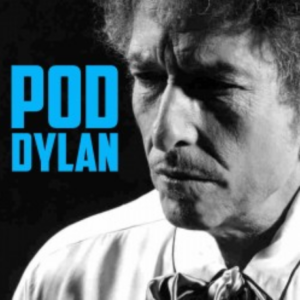
Here’s my episode of “Pod Dylan,” the podcast that examines the work of Bob Dylan, one song at a time.
The host, Freewheelin’ Rob Kelly, asks guests to pick a song to discuss, and I chose “Clothes Line Saga,” a stoned-out little tune that records a family conversation about doing laundry.
This was recorded by Bob and The Band as part of the home-made demos that became known as “the basement tapes” in the summer of 1967. It was first released officially on the 1975 compilation called The Basement Tapes and was later part of The Bootleg Series, Vol. 11: The Basement Tapes Complete in 2014.
The song was probably inspired by the huge hit of that summer, “Ode to Billy Joe” by Bobbie Gentry. But I don’t see the Dylan song as any kind of response to that Delta drama. To me, he’s just showing off his gifts as a songwriter. I can imagine him driving over to Big Pink, the Band’s headquarters-house, where they recorded the demos in the basement. Maybe heard Bobbie Gentry on the radio and thought, “I’m going write a song about laundry, motherfuckers!” After recording it, Garth Hudson of the Band, who was recording the music, marked the tape box with the title “Answer to Ode.”
Again, though, I don’t see it as an answer to anything. Maybe he did it just so show that he could. This is his only known recording of the song.
In addition to our conversation, this episode of Freewheelin’ Rob’s podcast includes Bob’s version of the song and part of a beautiful cover version by The Roches.
. . . . . . . . . . . . .
JULY 2019
A Magnificent GonzoFest
in Hunter’s Hometown
I finally made it to Gonzofest, Louisville’s annual celebration of hometown boy Hunter S. Thompson. It was great to be there, since my attendance all previous years had been thwarted by conflicts with my university schedule.
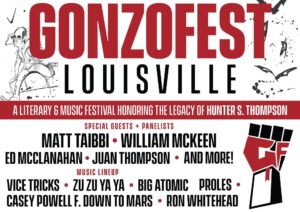 The annual event in Hunter’s old stomping ground is the brainchild of poet Ron Whitehead.
The annual event in Hunter’s old stomping ground is the brainchild of poet Ron Whitehead.
The conference featured Matt Taibbi of Rolling Stone; Margaret Ann Harrell, Hunter’s Hell’s Angels editor; Irish scholar Rory Patrick Feehan; Timothy Denevi, author of Freak Kingdom; Hunter’s son, Juan Thompson, and many others.
I spoke about Gonzo and its place in the development of American literary journalism. I also wrote a piece on the subject for Louisville’s alt-weekly.
Gonzofest was great fun and it was a hoot to hang out with such wonderful people, even if only for a short time.
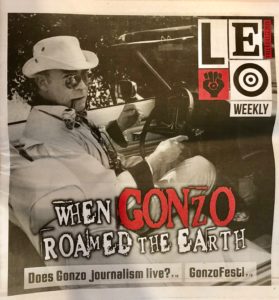 Click on the cover of Leo Weekly (at right) to read my cover story called “When Gonzo Roamed the Earth.” It’s a revised version of the afterword I wrote for Fear and Loathing Worldwide, a scholarly look at the impact of Hunter S. Thompson’s journalism around the globe.
Click on the cover of Leo Weekly (at right) to read my cover story called “When Gonzo Roamed the Earth.” It’s a revised version of the afterword I wrote for Fear and Loathing Worldwide, a scholarly look at the impact of Hunter S. Thompson’s journalism around the globe.
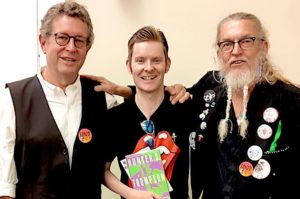
With Rory Patrick Feehan and Ron Whitehead at Gonzofest. Rory’s doctoral dissertation at Mary Immaculate College in Limerick, Ireland, was on Hunter S. Thompson.
My essay-remembrance about Tom Wolfe (“Tom Wolfe Elevated Journalism”) appeared in Fast Company. Click on the cover to read the piece.
. . . . . . . . . . . . .
JANUARY 2018
Blast from the past
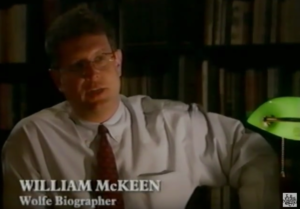
It’s not exactly “news,” but thanks to the gods of YouTube — and really, what did we do before it came along? — I’ve found the episode of “The Great Books” from The Learning Channel that features me. The great book we were featuring was The Right Stuff by Tom Wolfe.
Walter Cronkite’s production company made the film and I did my interview at Walter’s desk. I followed Chuck Yeager into the room, missing him by minutes, but awash in his lingering fumes. Good thing I didn’t strike a match.
. . . . . . . . . . . . .
JULY 2018
Rediscovering the ‘Lost Years’ of the Beach Boys
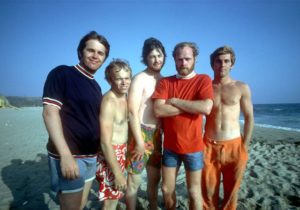
At the link below, you should be able to listen to my appearance on ‘Rock and Roll is Here to Stay,’ on WTBU Radio at Boston University.
Host Kiran Galani allowed me to put together a setlist and yammer about one of my favorite periods in American music: The Beach Boys, 1966-1972.
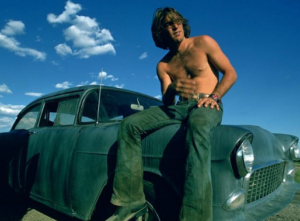
Their surf-and-turf heyday was past. Brian Wilson was semi-incapacitated by grief over his failed project, the ‘teenage hymn to God’ that was Smile. The other members of the group came forward and we begin to discover the creative soul of Dennis Wilson. The youngest Beach Boy, Carl Wilson, assumed leadership.
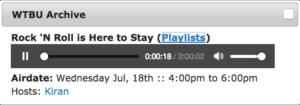
The show begins with part of Don McLean’s ‘American Pie,’ but soon moves into ‘Good Vibrations,’ then the music of the lost years.
This is the period explored in Everybody Had an Ocean.
Hope you enjoy.
. . . . . . . . . . . . .
From a Satisfied Reader
I just finished your excellent book Everybody Had An Ocean. You have a way of presenting the diverse stories surrounding all these artist and groups that is very compelling.
Truly a page turner. Really loved the way you jumped from one story to another, chapter by chapter. Little Byrds, here, some Buffalo Springfield there, then back to the Brian Wilson saga.
I have read a great deal in my life, and lately a lot about those magical times we lived through, and it is always nice to get a hold of a book that transports me back to those days in the way yours did.
JIM
(Psst. You can order the book here.)
. . . . . . . . . . . . .
MAY 2018
Remembering Tom Wolfe
Tom Wolfe died May 14, 2018, at 88. He was a titanic figure in American journalism.
I wrote a book about him and his work in 1995 and later helped him while he was doing research for his college novel, I Am Charlotte Simmons, which came out in 2004.
He was very kind to me and to my daughter Sarah, who hosted him at her University of Florida sorority, also part of his Charlotte Simmons research.
He was nice enough to write blurbs for a couple of my books — he called me “incomparable” when he praised Rock and Roll is Here to Stay — and sat still for a couple of interviews.
I was asked to write this piece for The Conversation about Wolfe’s importance to journalism.
Go to my Tom Wolfe page on this site — the page devoted to my book — to read a memoir of my time as his host. I also have a link to an interview I did with him for American History magazine. The subject was heroism. The Washington Post published a piece some years back about Wolfe’s time at the paper and it references my book. Here it is, if you’d like to read it.
He was an important figure in my life and I think we will all miss him terribly.
As I say in my piece for The Conversation, because of him — and some of the other literary journalists of his time — journalism went from being merely the means to an end, to being a justifiable end.
When young people ask me why all the fuss about the 1960s, what made it “pandemonium with a big grin” (a classic Tom Wolfe phrase), I hand them a copy of The Electric Kool-Aid Acid Test. That seems to do the trick. Fifty years on it remains the Great Book about the 1960s.
. . . . . . . . . . . . .
FEBRUARY 2018
Talking About Hunter S. Thompson
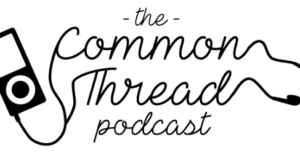 Here’s my appearance on the Common Thread Podcast, run out of the Howard Thurman Center at Boston University.
Here’s my appearance on the Common Thread Podcast, run out of the Howard Thurman Center at Boston University.
The primary interlocutor is Kobe Yank-Jacobs, with questions here and there from Patrick Reid.
[Note: The link to the podcast is broken. I’ll try to find where it lives and link to it there.]
It’s always a pleasure to talk about Hunter S. Thompson — and especially fun when the questions are so good and thought-provoking.
. . . . . . . . . . . . .
FEBRUARY 2018
My Manson Commentary
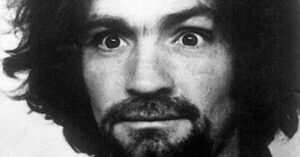 To listen, click on the insane man’s face.
To listen, click on the insane man’s face.
This audio is from the ‘Academic Minute’ at Inside Higher Ed, and is adapted from my article in The Conversation.
. . . . . . . . . . . . .
JANUARY 2018
Hey, Look Me Over!
 It’s not the kind of list you necessarily want to make, but hey — I guess this means my latest book, Everybody Had an Ocean,
It’s not the kind of list you necessarily want to make, but hey — I guess this means my latest book, Everybody Had an Ocean,
was worth some attention.
Click on the Huffington Post logo to find my latest on a list of the ‘Most Overlooked Books’ of the last year.
You can order this fine book by clicking here, and it will not be overlooked — at least not by a cool, groovy, neat and outasite person such as your own bad self.
. . . . . . . . . . . . .
From Another Satisfied Reader
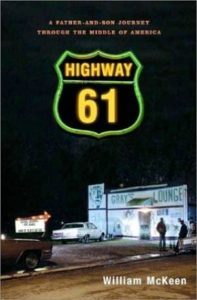 Just finished Highway 61. Same emotion as when I recently finished Mile Marker Zero for the second time – tears.
Just finished Highway 61. Same emotion as when I recently finished Mile Marker Zero for the second time – tears.
Highway 61 is like all of my road trips – I didn’t want it to end. The beauty of Highway 61 is what most of us would dream of – a long road trip with our child.
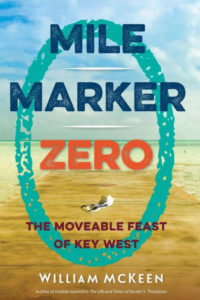
Thanks for this wonderful book, so full of information, facts, pleasures and observations. Don’t know why it took me so long to find it, but it is significant as a documentation of a time, places and people.
Thank you for writing.
STAN
Recent Writing

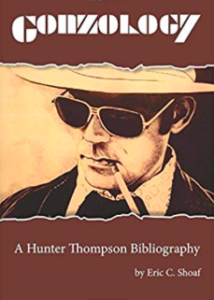
“McKeen weaves his story with
a natural storyteller’s grace.”
As far as I can tell, that’s the first time the word grace has ever appeared in a sentence with my name. (The sentence comes from a review in Under the Radar.)
Everybody Had an Ocean is available at fine bookstores everywhere, but if you are too lazy to go visit one of those wonderful places, you can order the book through IndieBound, a community of independent bookstores. You can get it at all the usual places, of course.
For example: here is the Amazon link.
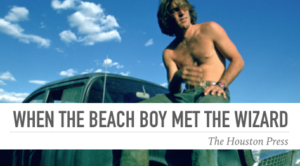
I interviewed all of the Beach Boys over the years, except for Brian Wilson. A writing partner interviewed him for a story we were working on in the mid-1970s. He said talking to Brian was like talking to a throw pillow.
I think he’s a lot better off now.
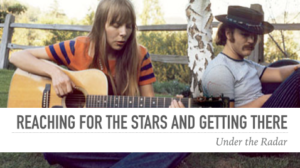
Beyond the Beach Boys, Everybody had an Ocean has an impressive cast of characters, including Michelle Phillips and Cass Elliot of the Mamas and the Papas, Charles Manson, Neil Young, Joni Mitchell, Sam Cooke, Tina Turner, Bobby Fuller, Phil Spector and an buttload of others. It’s a history of Los Angeles rock’n’roll in the 1960s, with a focus on the crossroads of the music business and crime.
The Current said “Everybody Had an Ocean is a great read, one that offers real insights into the burgeoning L.A. music scene in the ’60s.”
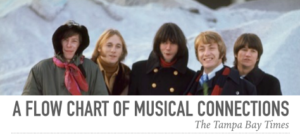
I post a lot of things related to the book on Facebook: videos of the artists I profile performing, for example.
Check out the book’s Facebook page.
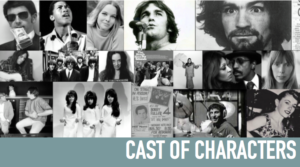
People talk to me about stuff
- The Los Angeles Times: Shoutout for Everybody Had An Ocean
- The Key West Ctizen: Quoted About the Death of Dink Bruce
- The Athletic: Sportwriting’s influence on Hunter Thompson
- Gentlemen’s Quarterly: Talking about Hunter Thompson’s Legacy
- The Boston Globe: Talking about gibberish in songwriting
- Smithsonian: Rock’n’roll’s greatest innovations
- Fortune: America’s rock’n’roll revolution
- The Washington Post: I’m quoted about Tom Wolfe
- Grantland: Quoted about Hunter Thompson’s Derby Article
- The Boston Globe: I talk about Facebook
- BU Today: Remembering my late colleague Jon Klarfeld
- The Houston Chronicle: Thoughts on Charles Manson
- The Conversation: Charles Manson’s perverted American Dream
- The Moscow Daily News: I make Mike Leach’s reading list
- Le Monde: Review of the French edition of Outlaw Journalist
- The Miami Herald: Tom Petty, homegrown in Florida
- Agence France-Presse: Key West hunkers down
- BU Today: Recalling the Music and Mayhem of Los Angeles
- Pantsuit Politics: What the Hell is Going on with Journalism?
- BU Today: David Carr’s Will to Excel
- Les Inrocktuptibles: French discussion of my Thompson books
- NHRA: Hot-rodding with the Beach Boys
- BU Today: Advice to graduates
- The East Bay Express: Fear and Loathing in (the New) Oakland
- The New York Times: Rolling Stone Stays Focused as Defamation Trial Is Set to Begin
- Salon: Fifty Years of Dylan, Album by Album
- Uproxx: Stories of the iconic ‘Johnny B. Goode’ Scene in ‘Back to the Future’
- The Christian Science Monitor: Google Removes Author Information from Search Results
- The Register Mail: Was JFK’s Assassination a Watershed Moment in the Redefining of Journalism?
- The Sun Sentinel: Tom McGuane’s Time in the Shade
- CNN: Journalism Jobs are Picking Up
- BU Today: A Day in the Rock’n’Roll Life
- The Sarasota Herald Tribune: What if ‘In Cold Blood’ Got it Wrong?
Long-Distance Friends

During a summer trip to Ireland, I met two Hunter S. Thompson scholars — Martin Flynn in Dublin and Rory Patrick Feehan in Limerick.
Martin runs the HST Books website, and Rory manages Totally Gonzo. We’d corresponded for years, but these were the first face-to-face meetings.
Oddly, they have never met each other, but they promise to get together soon and wrestle nude in creamed corn.
I was flattered to be asked to serve on Rory’s doctoral committee at Mary Immaculate College. He produced a superb piece of work. He insisted that I accompany him to four or five (I lost count) taverns that evening to celebrate.


For My Absent Friend
I recently learned of the death of my beloved friend and mentor, Starkey Flythe. I feel that I have done something awful by walking the earth these last four years without knowing he was gone.
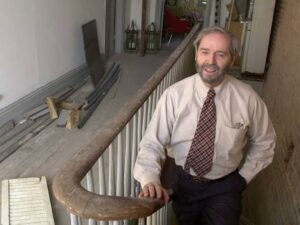
Starkey was managing editor of the Saturday Evening Post when I worked there in the mid-1970s. I learned so much from him.
He shaped my tastes in writing, introducing me to the works of Flannery O’Connor and Eudora Welty, and was himself a great voice of the South (and an O. Henry Award winner).
He was my graduate school, my mentor, my role model and my friend. He led a remarkable life. I hope he rests in peace.
Please look at this beautiful short film by Matthew Buzzell, “The Moment Before the Song Begins.” Spend eight wonderful minutes in Starkey’s world. It’s a celebration of his art and a tribute to a remarkable, eccentric and deeply talented man.
Here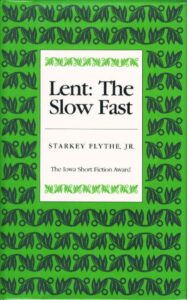 is the film, “The Moment Before the Song Begins.”
is the film, “The Moment Before the Song Begins.”
Here is the link to buy a collection of Starkey’s short stories, Lent: The Slow Fast.
Starkey was one of the most important people in my life and I treasure the opportunity to see him again, in this film.
Health Update
A decade after multiple surgeries, chemotherapy and radiation, I remain cancer-free. That does not mean things are ducky, though.
My sudden absence from social media a couple years back made some worry that I was seriously ill. Of course, this indicates that I spend too much time online, but friends felt there was something fishy about my silence and that, perhaps, I was sick.
Indeed I was. In fact, I nearly died.

In late August of that year, I was home, recovering from knee-replacement surgery and dealing with a series of urological issues. I thought I was going to be all right, but boy, was I wrong.
Turns out I was about two hours from death when Sarah, my quick-thinking eldest daughter (with an able assist from my ex-wife), made the executive decision to call an ambulance for me, over my objections.
I’ve told Sarah she now gets to play the I-told-you-so card the rest of her life. I was in septic shock with a 104-degree temperature, delirious and shaking with chills.
After emergency surgery and lots of antibiotics, I came back from the brink.
I didn’t cancel any of my classes and got help from colleagues who sat in for two class sessions. Luckily, another colleague, Susan Walker, stepped forward and shared the department-chair duties. This gave me time to concentrate on the limited things I could do — teaching class — before I resumed the chairly duties.
It was a tough time. I lost 15 pounds in one week. Sarah Kess, with whom I share an office suite, said I looked gaunt. As a guy who’s spent most of his life overweight, ‘gaunt’ was music to my ears. But gaunt is no good if you’re dead.
The strangest part of the experience was the double whammy thrown on my brain by the blood infection and the fever. I was rendered totally inarticulate and mute, unable to answer the simplest of questions. Talking to the EMT’s and struggling to answer their questions was probably one of the scariest moments of my health adventures of the last decade.
I’ve since had two bouts of septic shock but now that I know what it is, I can feel it coming and get the help I need.
I applaud and deeply appreciate the vigilance of the Dana Farber Cancer Institute. I’m there about four times a year as the staff studies my loathsome carcass, to make sure the cancer does not return. The quality of care is astonishing.
I tell the story of my health adventures in Asshole: A Memoir, available here and through the link above. I have a few more episodes to write before I’ll consider it finished. I haven’t gotten to the septic shock story yet and may write something about the lingering stuff that drives me crazy — neuropathy and tinnitus.
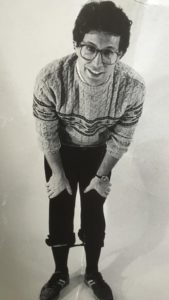
Rockin’ in the Free World
When the semester isn’t in session, I feel like a nuclear power plant that’s been shut down.
I’m in my 48th year as a college teacher and I’ve never gotten tired of it. I’ve never even had a sabbatical.

I taught at Western Kentucky University 1977-1982, at the University of Oklahoma 1982-1986, at the University of Florida, 1986-2010 and at Boston University, since 2010.
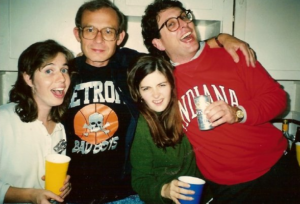
If you were in one of my classes, I’d love to hear from you at wmckeen@bu.edu.
I keep up with a lot of former students on Facebook, which I use as a sort of illustrated Rolodex of my life. It’s good to see how everyone’s doing.
Being a teacher is a lifetime commitment, so let me know if I can do anything to help you.
Take care.
Entire contents of the site Copyright © 2025 William McKeen

